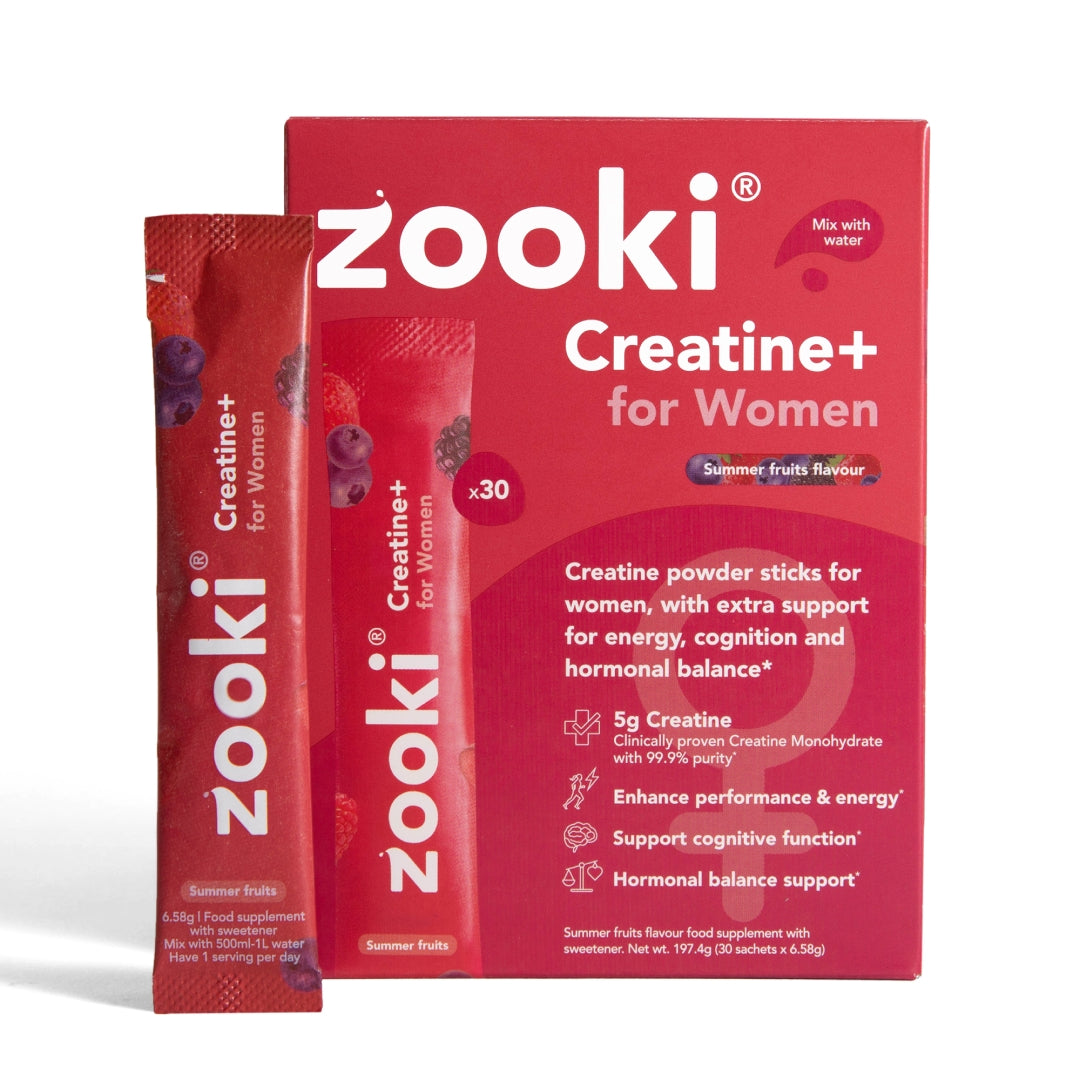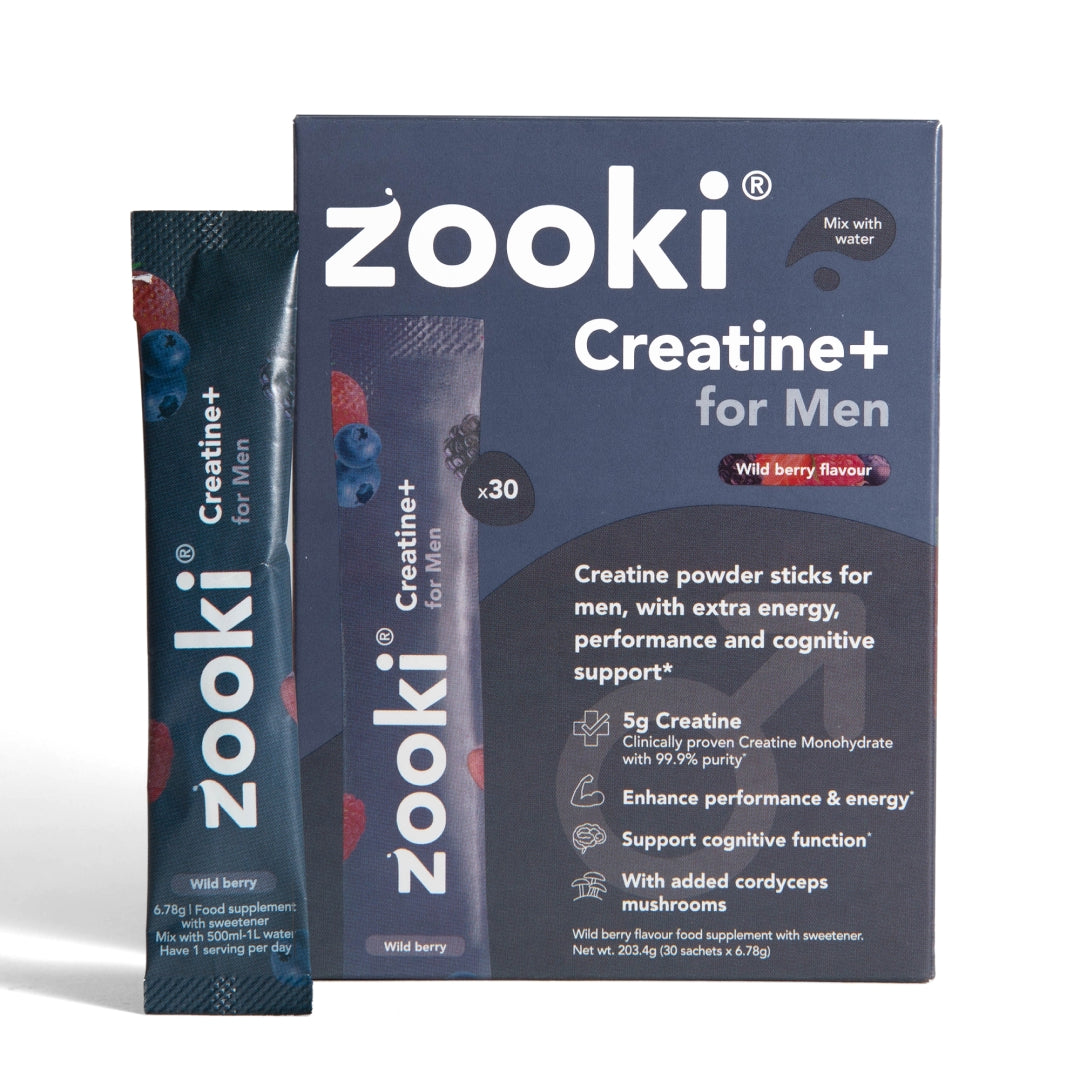Women Naturally Have Lower Creatine Stores
Here’s the first key difference: women tend to have up to 70–80% lower endogenous creatine stores than men. This isn’t a flaw, it’s simply a reflection of body composition, muscle mass, and dietary differences. But it does mean that women have more to gain when they start supplementing with creatine.
When those cellular “energy reserves” are topped up, women often notice:
-
More energy during workouts
-
Improved muscle tone and recovery
-
Sharper mental focus
-
Less fatigue during busy days
Pair your daily Zooki Creatine+ for women with Zooki Collagen to support muscle recovery and skin elasticity, especially if you’re training regularly or feeling tired muscles.
The Hormone Connection: Why Oestrogen Plays a Role
One of the most interesting findings in creatine research is the influence of female hormones, particularly oestrogen, on how creatine works in the body. Oestrogen helps regulate energy metabolism, cellular hydration, and brain function, which all intersect beautifully with creatine’s benefits.
During the menstrual cycle, energy fluctuations are common. Creatine may help stabilise energy and cognitive function during these shifts by supporting ATP regeneration in both the muscles and brain.
In other words, creatine works with your hormones, not against them, helping smooth out the natural ebbs and flows of female energy and performance.
Combine your Zooki Creatine+ for women with Zooki Vitamin B12 Liquid Sachets or Zooki Vitamin D Liquid Sachets help support natural energy metabolism and hormonal balance throughout your cycle.
The Brain Bonus: Women’s Cognitive Edge
It’s not just about muscles. Women also seem to experience greater brain-related benefits from creatine than men. In several studies, women supplementing with creatine scored higher on tests of short-term memory, focus, and mental performance, particularly under stress or sleep deprivation.
This makes sense when you realise that women’s brains may rely more heavily on phosphocreatine reserves during times of high mental demand. So by replenishing those stores, creatine becomes a mental performance enhancer, not just a physical one.
Study Spotlight: Women Outperforming the Guys
One 10-week study comparing men and women taking creatine found that:
-
Women saw a 15% increase in exercise performance.
-
Men improved by 6%.
That’s more than double the benefit. And when researchers looked at memory and cognition, women once again came out on top, showing greater improvements in recall, reaction time, and mental stamina.
Why This Matters for Women’s Health
Beyond the gym, creatine’s benefits for women extend into daily energy, bone health, and cognitive aging.
Regular supplementation helps:
-
Protect against age-related muscle loss (sarcopenia)
-
Support bone density and joint function
-
Improve mental sharpness and stress resilience
That’s why creatine is increasingly recognised as a foundational nutrient for women’s long-term vitality, not just a “fitness” supplement.
For complete cellular energy support, pair your Zooki Creatine+ for women with Zooki Vitamin C Liquid Sachets - it helps neutralise oxidative stress and supports collagen formation in muscles and skin.
The Takeaway
Women don’t just benefit from creatine: they excel with it. With lower natural creatine stores, more dynamic hormonal cycles, and higher demands on energy and focus, women have even more to gain from supplementing regularly.
So if you’ve been wondering whether creatine for women is worth it, the science says yes, absolutely. Think of it as your everyday energy equaliser: helping you think sharper, move stronger, and recover faster, all while working in harmony with your body’s biology.








Share:
What Creatine Does for Women's Brains vs Muscles - A Scientific Breakdown
Not a Gym Girl? Here's Why Creatine Still Matters for You